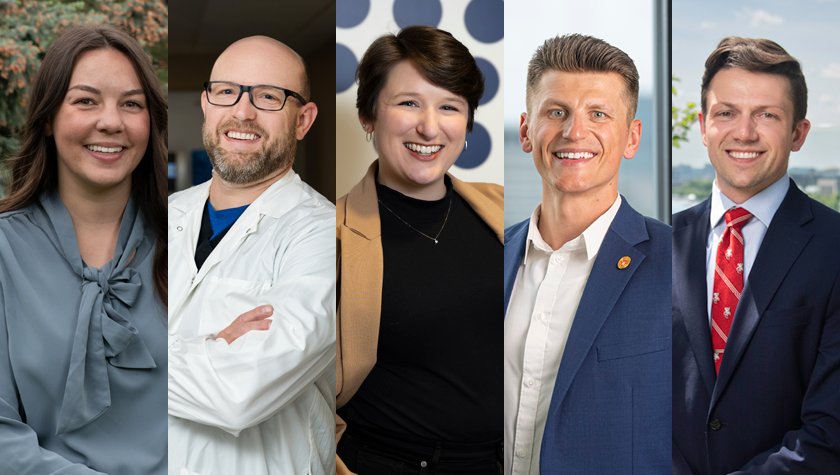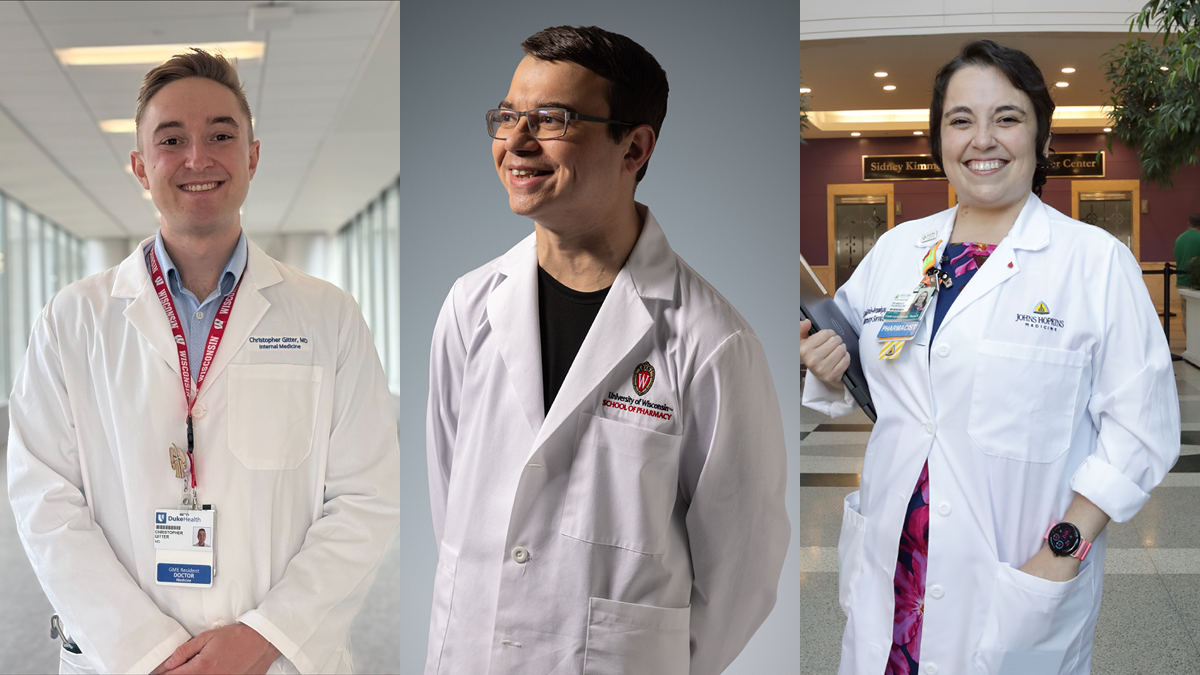
Following their own personal health battles, these School of Pharmacy alumni were driven to give back through careers in health care
By Archer Parquette
Lizeth Garcia-Jennings (PharmD ’20) slowly recovered from a heart transplant, years after winning a battle with cancer. Second-year PharmD student Jacob Timmerman sat through dialysis for years after two kidney transplants. And at five years old, Chris Gitter (BS ’20) was emergency airlifted across Wisconsin when a surgery addressing his cancer took a bad turn.
All three share degrees from the University of Wisconsin–Madison School of Pharmacy. And all three also share the same motivation to pursue a career in health care — their personal experiences navigating serious medical challenges. From facing the fear of a diagnosis, to the frustrations of treatment, to finding reassurance in the pharmacists, nurses, and physicians who helped them, all three have turned adversity into a calling to help others in need.
A childhood battle with leukemia
Chris Gitter is thankful he can’t remember much from before he was six years old. At age two, Gitter went from running around the house to struggling to drag himself across the floor. His parents, James (BS ’92) and Kristen Gitter (BS ’93), were both School of Pharmacy alums and immediately knew something was wrong. The doctors found that Chris had 18 hairline fractures up and down both of his legs. His bones had grown brittle because his marrow was no longer functioning due to what they would soon find out was acute lymphoblastic leukemia. Treatment began immediately.
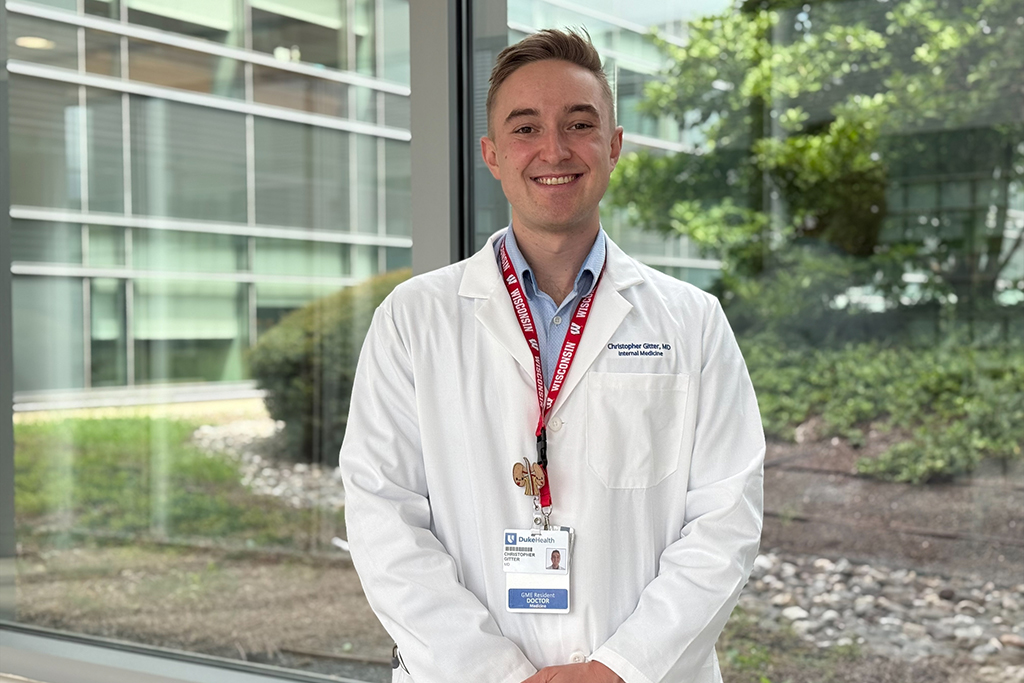
“My parents joke that I was the most meticulously dosed chemo patient ever,” Gitter says. “With my dad being a nephrologist and my mom a pharmacist, they made sure everything was exact down to the minute.”
Gitter doesn’t remember the spinal taps or the effects of chemo, but he does remember the flavor of the gas that knocked him out for surgery — root beer. At the end of his chemotherapy, when he was five years old, he was taken to a hospital in Appleton, Wisconsin, to have the catheter that delivered the infusions removed from his chest. While he was out, the doctors found that the catheter had fused with the vein it was in. That meant removal was notably riskier and required a vascular surgeon immediately. Fully intubated, Gitter was airlifted to Madison.
“My parents were following down the highway, I’m sure not obeying the speed limit,” Gitter says. Thankfully, the operation was a success. “My parents said that when I woke up, they knew I was OK because I was so mad that I got to ride in a helicopter and no one woke me up for it.”
In the decades since, Gitter has remained cancer-free. “I was a very boring patient for my doctors to see, which is a very good thing to be in an oncology clinic.”
“I think the biggest thing I’ve learned from my own medical experiences, and my family’s as well, is that you’re not just treating a patient — you’re treating their whole family.”
–Chris Gitter
The son of a doctor and a pharmacist, driven to help patients the same way his physicians helped him, Gitter can’t remember a time when a medical career wasn’t in the back of his head. Gitter’s cousin raved about the Pharmacology and Toxicology bachelor’s degree program at the School of Pharmacy, and Gitter, who already wanted to attend the same school as his parents, decided that was the program for him.
After earning his bachelor’s, he went on to graduate from the Medical College of Wisconsin with his MD in May 2025 and is now in the first year of an internal medicine residency at Duke.
“I think the biggest thing I’ve learned from my own medical experiences, and my family’s as well, is that you’re not just treating a patient — you’re treating their whole family,” Gitter says. “I know the repercussions that these things can have on a patient and their family years down the road. When you’re on the other side of that doctor-patient relationship, it changes your perspective, and I think it certainly makes me a better doctor.”
Surviving a heart transplant
Lizeth Garcia-Jennings arrived at the University of Iowa at age 18, excited to start her freshman year. But when she noticed strange symptoms slowing her down, she went to see a doctor and was diagnosed with acute myeloid leukemia.
Growing up in Iowa, Garcia-Jennings had worked as a pharmacy tech for a few years before going to college, and she was interested in the health care field. But now she suddenly found herself on the other side, stepping back from school to receive chemotherapy.
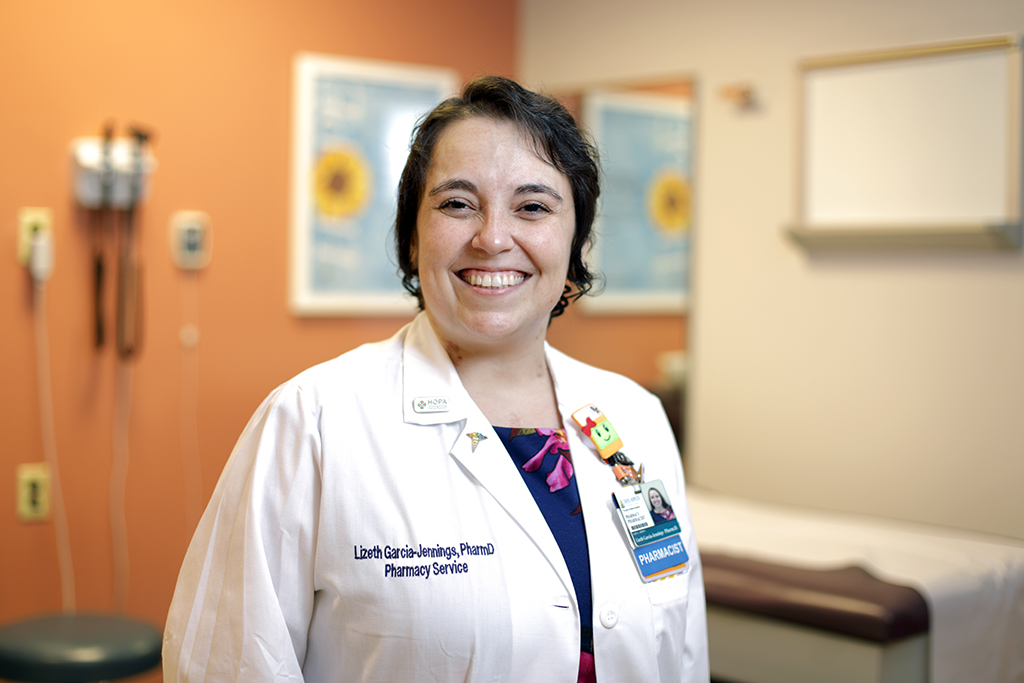
“During my hospitalization, one of the pharmacists would come in and walk through everything with me — possible side effects, what I should look out for. I had this great connection with her,” she says. “For the first time, I saw how pharmacists could be there for a patient in a hospital setting.”
After she was in remission, Garcia-Jennings finished her undergrad degree and went to work in the University of Iowa Hospital, coordinating blood and marrow transplants.
“I saw the interaction between the pharmacists, the physicians, the nurses, the social workers — and I saw how important the pharmacists were in oncology,” she says. “They’re at this unique point guiding each patient’s treatment. Seeing how a pharmacist is integrated in oncology teams really convinced me that was where I wanted to be.”
That brought her to the UW–Madison School of Pharmacy, where she started her PharmD degree in 2016. But that same year, she started to notice more symptoms: dizziness, heart palpitations. An EKG revealed that she had cardiomyopathy, a precursor to heart failure, that was caused by her chemotherapy. The symptoms worsened after her graduation from the School in 2020. She was getting so short of breath that just walking up and down a flight of stairs was becoming too difficult. By 2024, her risk of heart failure was rising, and her doctor listed her for a heart transplant — only three weeks later, she got the call that a donor was available.
“Everything I had to go through with my chemotherapy and heart transplant has pushed me to make sure every patient feels heard.”
–Lizeth Garcia-Jennings
“I ended up having an extended hospitalization for about three months after my transplant,” she says, due to having multiple complications, including infections, kidney failure, dialysis, and multiple surgeries for wound debridement. “In total, I ended up going through about 12 surgeries to complete my transplant process before being discharged home. It took a lot of collaboration with the physicians, nurses, pharmacists, physical therapists, speech therapists, everyone to get me back to where I was before that transplant.”
April 22 of this year officially marked one year since Garcia-Jennings’ successful transplant. She’s now a clinical pharmacy specialist at Johns Hopkins Hospital, where she specializes in ambulatory malignant hematology, helping many patients going through the same struggles she did.
“I’ve always felt that it’s important to have a connection with your patients,” she says. “I feel my job is to ensure that they can be advocates for themselves, and that they know that no matter what they can bring up any question or concern with their care team. Everything I had to go through with my chemotherapy and heart transplant has pushed me to make sure every patient feels heard.”
Recovering from a double kidney transplant
This summer, Jacob Timmerman was working as a pharmacy technician while studying at the School of Pharmacy. A woman came in asking about her Raynaud’s Syndrome, a painful condition that causes reduced blood flow to the fingers.
“I said, ‘Oh my gosh, I had the same thing last year,’” Timmerman says. He explained how he would put hot packs on his hands to keep his fingers from turning blue as the blood flow was restricted. “I understood the frustration she was going through.”
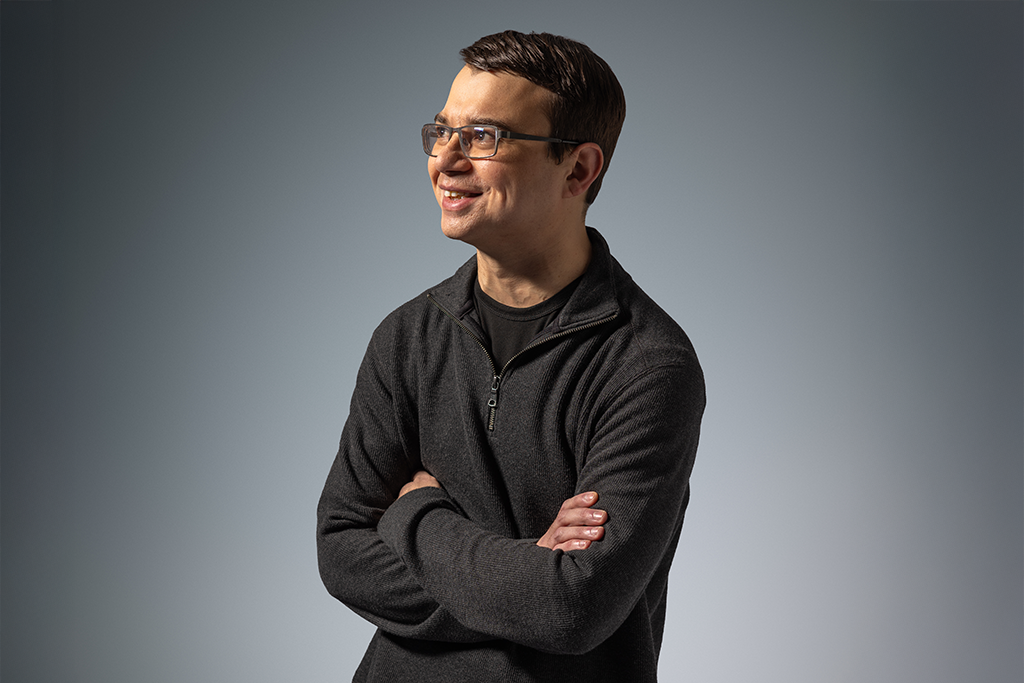
It might seem like one small interaction, but it’s one example of why Timmerman wants to become a pharmacist — and the difference he hopes to make.
When Timmerman was eight years old, he needed a kidney transplant. From birth, his bladder didn’t drain properly, and the fluid that built up around his kidneys damaged them beyond treatment. With two kidney transplants, he had to go on dialysis and deal with the constant barrage of medications and side effects.
“I would always look at my chart, and I started requesting images of X-rays and biopsy reports,” he says. “I tried to figure out what the different words meant, and it gave me this sense of control. Like if I understood what was going on in the nephron, or how my immune system was working, then it gave me some peace of mind.”
Eleven years after his first transplant, at 19 years old, Timmerman received another. At this point, his childhood interest in the science behind his transplant was developing into an interest in a medical career.
“One reason I was interested in pharmacy was because doctors were often prescribing these meds and they would give me terrible side effects,” Timmerman says. “But pharmacists can suggest alternatives or add on medications to help. The pharmacists I worked with actually had a lot of knowledge about my transplant medications, which were pretty uncommon medications.”
“When you’re waiting for an important medication or you’re dealing with a chronic health condition, it can really feel like a fight to survive sometimes. And I understand that with every patient I see.”
–Jacob Timmerman
After getting an associate’s degree at Milwaukee Area Technical College, Timmerman decided to pursue his pharmacy degree at UW–Madison. Now in his second year, he’s still considering what area of pharmacy to practice in, but he knows his own experiences will help him treat his patients with consideration and care.
“When patients are frustrated, I understand what that’s like,” he says. “When you’re waiting for an important medication or you’re dealing with a chronic health condition, it can really feel like a fight to survive sometimes. That’s how serious it is. And I understand that with every patient I see.”
